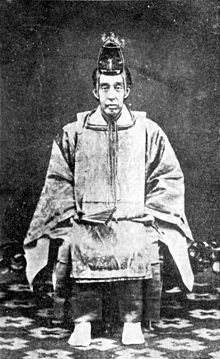Makino Tadayuki
| Makino Tadayuki | |
|---|---|

Makino Tadayuki
|
|
| 11th Lord of Nagaoka | |
|
In office 1858–1867 |
|
| Preceded by | Makino Tadamasa |
| Succeeded by | Makino Tadakuni |
| 54th Kyoto Shoshidai | |
|
In office 1862–1863 |
|
| Preceded by | Matsudaira Munehide |
| Succeeded by | Inaba Masakuni |
| Rōjū | |
|
In office 1863–1865 |
|
| Personal details | |
| Born |
October 22, 1824 Edo, Japan |
| Died | September 1, 1878 (aged 53) |
| Nationality | Japanese |
Makino Tadayuki (牧野 忠恭?, October 22, 1824 – September 1, 1878) was a Japanese daimyo of the late Edo period.
The Makino were identified as one of the fudai or insider daimyō clans which were hereditary vassels or allies of the Tokugawa clan, in contrast with the tozama or outsider clans.
The fudai Makino clan originated in 16th century Mikawa Province. Their elevation in status by Toyotomi Hideyoshi dates from 1588. They claim descent from Takechiuchi no Sukune, who was a legendary Statesman and lover of the legendary Empress Jingū.
Tadayuki was part of the senior branch of the Makino which was established at Tako Domain in Kōzuke Province in 1590; and in 1616, their holdings were moved to Nagamine Domain in Echigo Province. From 1618 through 1868, this branch of the Makino remained at Nagaoka Domain (74,000 koku) in Echigo Province.
Tadayuki was the 11th-generation head of this senior line of the Makino.
The head of this clan line was ennobled as a "Viscount" in the Meiji period.
Tadayuki served in the Tokugawa shogunate as a rōjū. He was the shogunates's fifty-fifth Kyoto shoshidai in the period spanning September 17, 1862 through July 26, 1863.
...
Wikipedia
